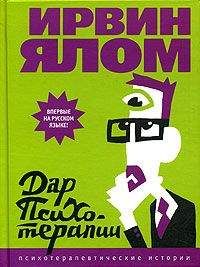Ирвин Ялом - The Schopenhauer Cure
Скачивание начинается... Если скачивание не началось автоматически, пожалуйста нажмите на эту ссылку.
Жалоба
Напишите нам, и мы в срочном порядке примем меры.
Описание книги "The Schopenhauer Cure"
Описание и краткое содержание "The Schopenhauer Cure" читать бесплатно онлайн.
«And you`ve given thought to the precise mechanics of our arrangement?»
«I`ve given much thought to it. In fact, Dr. Hertzfeld...”
«Julius.»
«Yes, yes—Julius. What I was going to say is that I`d been considering the idea of
calling you for several weeks to try to arrange supervision but kept putting it off,
primarily for financial reasons. So I was startled by the remarkable coincidence of your
call. As for mechanics, I suggest meeting weekly and splitting our hour: half the time you
provide expert advice about my patients, and half the time I am your guide to
Schopenhauer.»
Julius closed his eyes and lapsed into thought.
Philip waited two or three minutes and then: «What say you to my offer? Even
though I`m certain no students will appear, I`m scheduled for office hours after my
lecture and so must head back to the administration building.»
«Well Philip, it`s not your everyday offer. I need more time to think it through.
Let`s meet later this week. I take off Wednesday afternoons. Can you do four o`clock?»
Philip nodded. «I finish at three on Wednesday. Shall we meet in my office?»
«No, Philip. My office. It`s in my home at two–forty–nine Pacific Avenue, not too
far from my old office. Here, take my card.»
Excerpts from Julius`s Journal
After his lecture Philip`s proposal for a supervision–tutoring swap stunned me.
How quickly one moves back into the familiar force field of another person! So much like
the state–dependent memories in dreams in which the landscape`s eerie familiarity
reminds you that you`ve visited the identical locale before in other dreams. Same with
marijuana—a couple of hits and suddenly you`re in a familiar place thinking familiar
thoughts that exist only in the marijuana state.
And it`s the same with Philip. Only a little time in his presence and—presto—my
deep memories of him plus a peculiar Philip–induced state of mind reappear in a flash.
How arrogant, how disdainful he is. How uncaring about others. And yet there is
something, something strong—I wonder what?—that draws me to him. His intelligence?
His loftiness and otherworldliness coupled to such extraordinary naГЇvetГ©? And how
unchanged he is after twenty–two years. No, that`s not true! He`s liberated from the
sexual compulsion, no longer doomed to walk nose–to–ground forever sniffing for pussy.
He lives much more in the higher places he`s always longed for. But his
manipulativeness—that`s still there, and so patent, and he`s so clueless about its
visibility, about how I should leap at his offer, how I should give him two hundred hours
of my time in return for his teaching me Schopenhauer, and brazenly presenting it as
though it was I who suggested it, who want and need it. Can`t deny that I have some
slight interest in Schopenhauer, but spending a couple hundred hours with Philip to learn
about Schopenhauer right now is low on my wish list. And if that excerpt he read about
the dying Buddenbrooks is a prime example of what Schopenhauer has to offer me, then it
leaves me cold. The idea of rejoining the universal oneness without any persistence of me
and my memories and unique consciousness is the coldest of comfort. No, it`s no comfort
at all.
And what draws Philip to me? That`s another question. That crack the other day
about the twenty thousand dollars he wasted on his therapy with me—maybe he is still
looking for some return on his investment.
Supervise Philip? Make him a legitimate, kosher therapist? There`s a dilemma. Do
I want to sponsor him? Do I want to give him my blessing when I don`t believe that a
hater (and heisa hater) can help anyone grow?
8
Halcyon Days
of Early
Childhood
_________________________
Religionhas everything on its
side: revelation, prophecies,
government protection, the
highest dignity and
eminence...and more than this,
the invaluable prerogative of
being allowed to imprint its
doctrines on the mind at a
tender age of childhood,
whereby they become almost
innate ideas.
_________________________
Johanna wrote in her diary that after Arthur`s birth in February 1788 she, like all young
mothers, enjoyed playing with her «new doll.» But new dolls soon become old dolls, and
within months Joanna wearied of her toy and languished in boredom and isolation in
Danzig. Something new was emerging in Johanna—some vague sense that motherhood
was not her true destiny, that some other future awaited her. Her summers at the
Schopenhauer country estate were particularly difficult. Though Heinrich, accompanied
by a clergyman, joined her for weekends, Johanna spent the rest of her time alone with
Arthur and her servants. Because of his fierce jealousy, Heinrich forbade his wife to
entertain neighbors or to venture from home for any reason.
When Arthur was five, the family encountered great stress. Prussia annexed
Danzig, and, shortly before the advancing Prussian troops arrived under the command of
the very general Heinrich had insulted years before, the entire Schopenhauer family fled
to Hamburg. There, in a strange city, Johanna gave birth to her second child, Adele, and
felt ever more trapped and despairing.
Heinrich, Johanna, Arthur, Adele—Father, mother, son, daughter—the four bound
together yet unconnected.
To Heinrich, Arthur was a chrysalis destined to emerge as the future head of the
Schopenhauer mercantile house. Heinrich was the traditional Schopenhauer father; he
attended to business and put his son out of mind, intending to spring into action and
assume fatherly duties when Arthur had finished his childhood.
And the wife, what was Heinrich`s plan for her? She was the Schopenhauer family
seedpod and cradle. Dangerously vital, she had to be contained, protected, and restrained.
And Johanna? What did she feel? Trapped! Her husband and provider, Heinrich,
was her lethal mistake, her joyless jailer, the grim evacuator of her vitality. And her son,
Arthur? Was he not part of the trap, the seal to her coffin? A talented woman, Johanna
had a desire for expression and self–realization that was growing at a ferocious pace, and
Arthur would prove a woefully inadequate recompense for self–renunciation.
And her young daughter? Little noticed by Heinrich, Adele was assigned a minor
role in the family drama and was destined to spend her entire life as Johanna
Schopenhauer`s amanuensis.
And so the Schopenhauers each went their separate ways.
Father Schopenhauer, heavy with anxiety and despair, lumbered to his death,
sixteen years after Arthur`s birth, by climbing to the upper freight window of the
Schopenhauer warehouse and leaping into the frigid waters of the Hamburg canal.
Mother Schopenhauer, sprung from her matrimonial trap by Heinrich`s leap,
kicked the grime of Hamburg from her shoes and flew like the wind to Weimar, where
she quickly created one of Germany`s liveliest literary salons. There she became the dear
friend of Goethe and other outstanding men of letters, and authored a dozen best–selling
romantic novels, many about women who were forced into unwanted marriages but
refused to bear children and continued to long for love.
And young Arthur? Arthur Schopenhauer was to grow up into one of the wisest
men who ever lived. And one of the most despairing and life–hating of men, a man who
at the age of fifty–five would write:
Could we foresee it, there are times when children might seem like innocent prisoners
condemned not to death but to life and as yet all too unconscious of what their
sentence means. Nevertheless every man desires to reach old age...a state of life of
which it may be said «it is bad today, and every day it will get worse, until the worst
of all happens.»
9
_________________________
Inendless space countless
luminous spheres, round each
of which some dozen smaller
illuminated ones revolve, hot
at the core and covered with a
cold hard crust on which a
mouldy film has produced
living and knowing beings—this
is...the real, the world.
_________________________
Julius`s spacious Pacific Heights home was far grander than any he could now possibly
afford to buy: he was one of the lucky millionaires in San Francisco who had the good
fortune to buy a house, any house, thirty years earlier. It was his wife, Miriam`s, thirty–thousand–dollar–inheritance money that had made the purchase possible, and, unlike any
other investment Julius and Miriam had ever made, the house`s value had rocketed
upward. After Miriam`s death, Julius considered selling the house—it was far too large
for one person—but instead he moved his office into the first floor of the house.
Four steps led from the street to a landing with a blue–tiled fountain. On the left, a
few stairs led to Julius`s office, on the right was a longer stairway to his home. Philip
arrived precisely on time. Julius greeted him at the door, escorted him into the office, and
gestured toward an auburn leather chair.
«Some coffee or tea?»
But Philip did not look around as he took his seat and, ignoring Julius`s offer, said,
«I await your decision about supervision.»
«Ah, once again, straight to the business at hand. I`ve having a difficult time with
that decision. Lots of questions. There`s something about your request—a deep
contradiction—that puzzles the hell out of me.»
«Undoubtedly, you want to know why I`m asking you for supervision after being
so dissatisfied with you as a therapist?»
«Precisely. In exceedingly clear language you claimed that our therapy was a
colossal failure, a waste of three years and a great deal of your money.»
«There`s no true contradiction,” Philip replied instantaneously. «One can be a
competent therapist and supervisor even though one fails with a particular patient.
Research shows that therapy, in any hands, is unsuccessful for about a third of patients.
Besides, there`s no doubt I played a significant role in the failure—my stubbornness, my
rigidity. Your only error was to choose the wrong type of therapy for me and then persist
in it far too long. However, I`m not incognizant of your effort, even your interest, in
helping me.»
«Sounds good, Philip. Sounds logical. But still, to ask for supervision from a
therapist who gave you nothing in therapy. Dammed if I`d do it—I`d find someone else. I
have a feeling that there`s something more, something you`re not saying.»
«Perhaps a modest retraction is in order. It is not entirely accurate to say I got
nothing from you. You did make two statements that stuck with me and may have played
some instrumental role in my recovery.»
For a moment Julius fumed about having to ask for details. Did Philip think he
wouldn`t be interested? Could he be that much of a space cadet? Finally, he gave in and
said, «And which two statements?»
«Well, the first statement doesn`t sound like much, but it had some power. I had
been telling you about one of my typical evenings—you know, picking up a woman
somewhere, taking her to dinner, the seduction scene in my bedroom with the same
routine and the same mood music. I remember asking your opinion of my evening and
whether you found it distasteful or immoral.»
«I don`t remember my answer.»
«You said you found it neither distasteful nor immoral, only boring. It jolted me to
think that I was living a boring, repetitious life.»
«Ah, interesting. So that was one statement. The other?»
«We were discussing tombstone epitaphs. I don`t remember why, but I believe you
had raised the question of what epitaph I might select for myself...”
«Very possible. I`ve used that question when I feel at an impasse and need some
shocking intervention. And...?»
«Well, you suggested that I might have my tombstone engraved with the phrase
«He liked to fuck.» And then you added that the phrase could be a good epitaph for my
dog too—that I could use the same stone for both me and the dog.»
«Pretty strong stuff. Was I really that harsh?»
«Whether it is harsh or not is irrelevant. What`s important is its effectiveness and
persistence. Much later, maybe ten years later, I made use of it.»
«Time–delayed interventions! I`ve always had a hunch they`re more important than
usually thought. Always meant to do a study of that. But for our purposes today tell me,
why were you reluctant at our last meeting to mention these, to acknowledge that I had in
some way, even some small way, been useful to you?»
«Julius, I`m not sure I see the relevance of this to the issue at hand—that is,
whether you are or are not willing to be my psychotherapy supervisor? And to permit me
in return to be your Schopenhauerian adviser?»
«The fact that you don`t see the relevance makes it all that more relevant. Philip,
I`m not going to attempt to be diplomatic. Here it is straight: I`m not certain you`re
basically equipped to be a therapist, and hence I have some doubts that supervision
makes sense.»
«You say, not вЂequipped`? Clarify please,” said Philip with no trace of discomfort.
«Well, let me put it this way. I`ve always regarded therapy more as a calling than a
profession, a way of life for people who care about others. I don`t see sufficient caring in
you. The good therapist wants to alleviate suffering, wants to help people grow. But I see
in you only disdain for others—look at the way you dismissed and insulted your students.
Therapists need to relate to their patients, whereas you care little about how others feel.
Take the two of us. You tell me that, on the basis of my phone call to you, you made the
assumption that I had a fatal illness. Yet never did you utter a word of consolation or
sympathy.»
«Would that have helped—mumbling some vacuous words of sympathy? I gave
you more, much more. I constructed and delivered an entire lecture for you.»
«I understand that now. But it was all so oblique, Philip. It made me feel like I was
being managed, not cared about. Better for me, much better, if you had been direct, if you
had sent some message from your heart to mine. Nothing monumental, maybe just some
simple inquiry into my situation or state of mind, or, Christ, you might have simply said,
вЂI`m sorry to hear you`re dying.` How hard would that have been?»
«If I were sick, that`s not what I`d want. I would have wanted the tools, the ideas,
the vision that Schopenhauer offered in the face of death—and that`s what I delivered to
you.»
«Even now, Philip, you still don`t bother to check your assumption that I have a
fatal illness.»
«Am I mistaken?»
Подписывайтесь на наши страницы в социальных сетях.
Будьте в курсе последних книжных новинок, комментируйте, обсуждайте. Мы ждём Вас!
Похожие книги на "The Schopenhauer Cure"
Книги похожие на "The Schopenhauer Cure" читать онлайн или скачать бесплатно полные версии.
Мы рекомендуем Вам зарегистрироваться либо войти на сайт под своим именем.
Отзывы о "Ирвин Ялом - The Schopenhauer Cure"
Отзывы читателей о книге "The Schopenhauer Cure", комментарии и мнения людей о произведении.








